- Home
- Dan Abnett
I am Slaughter Page 7
I am Slaughter Read online
Page 7
Wire nodded ruefully.
‘I came, old friend,’ said Vangorich, ‘because there is a possibility, with all other options exhausted, that one day soon I might have to ask you to go back to your old job.’
‘Glory,’ Wire whispered. He took a deep breath. ‘I can’t go back, sir. Not after all this time… I mean, that’s not me any more. I left the Officio…’
Drakan Vangorich looked at him without pity or humour.
‘Beasts arise, Esad,’ he said. ‘And besides, one never really leaves the Officio.’
Fourteen
Ardamantua – outer system approaches
The translation bells were sounding along the quarterdeck of the Azimuth.
Daylight rose to his feet from the arming block, took his helm off the rack, and lowered it over his head. The neck seals hissed and whirred into place.
An attendant approached, dressed in a yellow gown.
‘I heard,’ said Daylight before the man could speak.
The Imperial Fist methodically placed his bolter in its clamp, selected a gladius and sheathed it, and mag-locked a combat knife to his chestplate. Then he finally adorned his head with the laurel wreath that marked him as the senior Imperial Fist in the reinforcement detachment. The laurel symbol had already been painted on his shoulderplates.
He turned and walked from the arming chamber, out onto the quarterdeck space. Hundreds of attendants in yellow robes stopped and watched him as he strode forwards. It was a moment, a singular moment. Daylight was going to war.
Daylight was aware of the significance. He had longed for war, and felt guilty for doing so. Only the best were ever given the reward of wall-brother status, but it amounted to a punishment, because it took them from the zones of glory and made them live out their lives on ceremonial sentry duty in the draughty halls of the Palace of Terra.
This had been his dream since he had won the status. Going back to war had been his dream.
Yes, the significance was not lost on him. It was a day full of significance. It was the first time ever that wall-brethren had been allowed to leave Terra and the Phalanx and go to war in support of their kind, the first time that the entire Chapter had been committed at one stroke since the days of the Siege, when they had been a Legion still. The first time since then that a capital threat had come inside fifty warp-weeks of the Terran Core.
Though he was a creature bred for war, Daylight was not blind to the political significance either. Attending the Palace as he had done for so many years, he had watched the activities of the Senatorum and knew power play and counter-agendas when he saw them. Daylight’s glorious return to war, and the wielding of the Imperial Fists as one unified weapon at this time of crisis, were merely by-products of Lord High Admiral Lansung’s ascension. He had made himself look quite imperial by moving his forces in support of the Fists, and even more imperial by magnanimously suggesting that the Fists support and preserve their reputation. He had, in effect, facilitated everything that was happening. The fact that he had effectively sent an entire Chapter of Adeptus Astartes to war left a great deal more unsaid about his power.
Attendants swept up on either side of Daylight and attached a long cloak to his shoulders, a cloak of blue silk that trailed out behind him. Armed footmen fell in step around him, an honour guard supplied by Heth. Just like politics, the cloak was an encumbrance that Daylight would dispense with in combat.
They moved up the quarterdeck, and under the valveway arches. The burnished deck throbbed beneath them as the warship bled out power. The warp had just spat out the Azimuth after six and a half weeks of travel, and now, translated into the realm of real space, they and the rest of the reinforcement squadron were slicing in across the outer banks and belts of the Ardamantua System into the compliance zone.
As he walked, Daylight processed. Data-feeds were inflowing to his visor mount, and had been since the trip began. He processed the latest intercepts and battle reports from the line formation, archived data on the planet and the blisternest site, force composition and a rolling track of action-by-action detail from the very first moment of deployment onwards. From the outside, Daylight looked like a ceremonial figure walking in a grand state parade. On the inside, he was a strategium in war mode.
Most of the data he could process was archived, however. It came from the early part of the compliance, and from intercepts received before the reinforcement squadron had left the Terran Core. They had spent weeks in the empyrean, and nothing viable or reliable had entered the data-streams of astropathic communication links during the voyage.
Now they were back in real space, the vast leap of their extra-universal transit achieved, communication could resume.
Except, Daylight could see from the feeds, nothing was coming from the world called Ardamantua.
Nothing human.
He entered the warship’s state bridge. Navy officers turned to acknowledge him with formal stiffness, but a gesture sent them back to their vast consoles, set in tiers up the mountainside flanks of the chamber. On high platforms with gilded handrails, strategy officers plotted courses and operated the vast hololithic displays of the central strategium. Lines of Navy armsmen in formal uniforms, in ranks forty long and seven wide, stood facing each other on the central, mirror-polished steel floorspace of the bridge, forming an avenue down which Daylight could proceed to the command dais. They came to attention, their silver lascarbines raised.
Daylight walked the line, still processing.
Nothing human, nothing human…
Admiral Kiran stepped off the dais to meet him, escorted by General Maskar and a small army of aides, subalterns and autoclerks. Kiran was Lansung’s appointed proxy, a slender and unfriendly-looking man in late middle age with a permanently cunning expression on his face. He wore silver and blue, and a broad bicorn hat. He carried the ship’s command wand in his left hand. The wand was a jewel-encrusted device the size of a sceptre or battle-mace, and it hummed soft songs of deep space and the warpways to itself.
Maskar was Lord Commander Militant Heth’s proxy on the command warship, though Heth travelled with the squadron aboard the grand carrier Dubrovnic. Unlike Lansung, who had seen the Ardamantua crisis in purely political terms and had instructed his officers to conduct it on his behalf, Heth was a more selfless individual. He appreciated the potential scale of the crisis and had elected to join the reinforcements in person. He led sixty-eight brigades of the Astra Militarum, the biggest deployment from the core seen in years, and he was not about to place that in the hands of his juniors. Heth wanted to show that unlike Lansung and, indeed, the other High Lords, he was prepared to get his hands dirty. The Imperial Fists required the assistance of his Astra Militarum, and he intended to deliver that in person.
It had caused a stir when Heth had announced his intention of joining the squadron. There was nothing Lansung could say about it that wouldn’t look petty, but Lansung’s thunder had been stolen a little. Heth was positioning himself as a willing man of the people, a leader who did rather than told. It was clear that Heth saw this moment as an opportunity to show that the Astra Militarum, vast and reliable, was the most important service standing in the Imperium’s defence, the truest and most doughty.
It was also an opportunity for Heth to ease himself out of the shadow cast across the Senatorum High Twelve by Lansung, Mesring and Udo.
As per protocol, not all the squadron’s senior officers travelled on the same vessel. Vox-officers set up a real-time link to Heth so he could coordinate with them.
Maskar was a useful officer, short and bullish, with an excellent track record. He had not long returned from service in a frontier campaign, the ‘blood fresh on his tunic’ as the phrase went. Daylight had read Maskar’s file. He liked the man, liked him for what he could do.
None of that data was pertinent now: not Maskar’s file, not the politics on Terra.
&
nbsp; ‘Sir,’ said Kiran.
‘Anything?’ asked Daylight. ‘Anything from the surface?’
‘No,’ replied the admiral.
‘Nothing human,’ Maskar added with a growl.
‘I have reviewed the incoming data,’ said Daylight. ‘It’s very noisy down there.’
Kiran nodded to one of his analysis officers, who projected a small hololithic display between his tech-engraved hands as though he was opening a book for them to look at.
‘Since our last data from Ardamantua,’ the analysis officer said, ‘the surface and atmospheric situations have degenerated catastrophically. The planet seems to have been plunged into some kind of stellar crisis. It’s almost primordial down there. We presumed at first that it might have been struck by another body, a large meteor, but there is no trace of that very distinctive damage pattern.’
Daylight watched the man’s shifting display, staying one step ahead of everything he said.
‘Ardamantua has been rendered unstable in the six weeks since we last saw it,’ the analysis officer continued. ‘It is unstable atmospherically, geologically and orbitally. There are gross levels of surface radiation, and significant signs of massive gravitic instability.’
‘There were never any indications of gravitic weaknesses in the early planetary surveys,’ said Admiral Kiran.
‘However,’ said Maskar, ‘some of the last few intercepts we received from the expedition force before we departed spoke of what appeared to be gravitational anomalies.’
‘That data was never substantiated,’ said the analysis officer. ‘We have been attempting to contact Terra astropathically to see what they may have heard from the expedition fleet while we were in transit.’
‘The answer is precious little, it seems,’ said Kiran. He looked directly at the towering Space Marine. ‘All effective contact with your Chapter Master and the expedition fleet was lost over six weeks ago, two days after we entered the warp.’
‘So they are gone?’ asked Daylight. ‘Dead?’
‘There is no sign of the fleet or of any surface deployment,’ said Maskar. ‘But that isn’t to say they aren’t there.’
‘The planet and its orbital environs are a mess of interference patterns and disruption,’ said the analysis officer. ‘It is quite possible that the fleet is there, as well as surface forces, but our scanners can’t detect them and we can’t hear their vox.’
‘So what are we hearing?’ asked Daylight.
‘Massive amounts of sonic and infrasonic noise bursts,’ said the analysis officer, ‘similar to the kind of noise bursts reported by the surface forces before comms went down, but of greater intensity, duration and regularity. It’s as though the planet is howling in agony.’
Kiran shot the man a scolding look. The analysis officer stepped back, ashamed of his colourful description.
‘What’s making the noise?’ asked Daylight.
‘I think it’s some kind of stellar effect,’ said Kiran. ‘A solar storm, perhaps, or a transmitted by-product of the gravitational mayhem.’
‘Except,’ said Maskar.
‘Except?’ asked Daylight.
‘It reads as organic,’ said Lord Commander Militant Heth’s proxy. He said it hesitantly, as though he didn’t quite believe it himself.
‘How can it be organic?’ asked Daylight.
‘A voice,’ murmured the analysis officer. ‘It’s like a voice…’
‘It’s something amplified and broadcast,’ said Maskar.
‘A weapon of some description?’ suggested Kiran.
‘What action do we take?’ asked Maskar.
‘We deploy, of course,’ said the unmistakable tones of the Lord Commander Militant.
They turned. The vox and pict link had been established to the Lord Commander Militant’s vessel, and his face, slightly crackled by interference patterns, had appeared in the ruddy field of a large hololithic projector unit.
‘Is that not rash, my lord?’ asked Admiral Kiran. ‘We don’t even know how close we can get and maintain the safety of the squadron.’
‘We travelled six weeks to face a problem and perhaps save the lives of some honoured friends,’ said Heth, his voice signal distorting slightly. ‘We are also investigating a potential capital threat to the Terran Core. I don’t think this is the time to be prissy. How long until we’re inside a decent deployment distance, admiral?’
‘Four hours and seventeen minutes,’ replied Kiran.
‘Are the men ready for planetary landing, general?’ Heth asked.
‘All infantry and armour support will be boarded on the drop-ships and surface landers within the hour, sir,’ replied Maskar. ‘I can commit a full force drop as soon as we are in range.’
‘And the Imperial Fists?’ asked Heth. ‘The wall-brethren?’
‘We are ready,’ replied Daylight.
‘Then the only thing that appears rash,’ said Heth, ‘is the notion of me making this decision rather than waiting to hear it from the nominated and honoured commander of this expedition. Forgive me, sir. The call is yours.’
There was a pause.
‘Thank you, my lord,’ said Daylight. ‘Given the extremity of the conditions, I believe it would be prudent to arrange an advance recon, fast and powerful, to penetrate the zone and report back before we risk the bulk of our forces. I will lead this. Have a ship prepared.’
Daylight looked at Heth.
‘The main force should be held at readiness. As soon as we have data, and as soon as an enemy or objective is identified, the fleet elements and the Imperial Guard will take it with the fury of the Emperor Himself. Does that seem like a plan to you, my lord?’
‘I couldn’t have put it better myself,’ replied Heth.
‘Then let us begin,’ said Daylight.
‘The Emperor protects,’ nodded Maskar and Kiran, making the sign of the aquila.
‘And we, in our turn,’ replied Daylight, ‘protect Him.’
Fifteen
Ardamantua
Like stooping raptors, pinions swept back for the long dive, the Stormbirds plunged into the swirling atmospheric halo surrounding stricken Ardamantua.
The planet was swathed by a bright, visible corona of agitated energy, a sensor-opaque aura that shrouded the orb to almost the depth of its own radius. It resembled a solar storm, a swirling, luminous ocean of gas, dust and radiation that flickered in blues, golds, ambers and reds. The planet itself was just a dark globe, silhouetted within the maelstrom.
Just as the wall-brothers had been drawn out of traditional service and allowed to roam away from Terra, so the Stormbird war machines, the fastest and most honoured of all the drop-craft in the arsenal of the Adeptus Astartes, had been selected for the reinforcement mission. Stormbirds, sleek, powerful and large-capacity, had been born in the earliest years of the Great Crusade, developed from the almost mythical Skylance drop-ships that had served during the final days of the Unification Wars splitting open the hives of Ceylonia and Ind. Stormbirds had been the inter-orbital weapon of choice throughout the Crusade, and through the dark, treacherous time that had been the unexpected sequel to that bright glory.
The Heresy had consumed them in great numbers, however, just as it had consumed men and brothers and Legions, and the forces of the Imperium had been obliged to resort to more utilitarian vehicles that were cheaper and easier to mass produce. These replacement craft were now ubiquitous in all Chapters, and had proved worthy of service through their simple functionality and durability.
Still, for those with long memories, there was nothing like a Stormbird to stir the heart. The symbol of the Emperor’s wrath, wings hooked back like an aquila – one only saw them in ceremonial flypasts these days, or in the Hall of Weapons, or as escorts for High Lords, warmasters and sector governors.
Daylight had ordered six of th
em to be raised from the Fists’ Chapter House hangars and stowed aboard the reinforcement fleet. No one had argued. Heth’s presence on the campaign mission had helped. He was a High Lord, after all.
Firing from the capital ships like missiles, the Stormbirds formed a formation spread and scream-dived into the unholy vortex surrounding the planet. Ardamantua lay beneath them, a vast curve of grey mottled with orange and crackled with veins of fire. Cloud banks and storm patterns of vast magnitude curdled and swirled across the boiling surface. Magnetics, radiation and the pop of gravity blisters rendered the nearspace realm a lethal soup.
‘We have substantial vulcanism around the equatorial belt,’ reported the lead Stormbird’s tech-adept. ‘The crust there is faulting and splitting.’
The Stormbird was shaking. Daylight keyed up the data on his overhead monitor and swung it down on its gimbal arm. On the flickering pict, strung with overlays, the planet seemed to have a burning, white-hot girdle around its waist.
‘Something’s happening to the magnetic poles,’ said the adept. ‘The planet is deforming. I–’
His voice cut out briefly as another noise burst ripped through the vox-links, squalling and deafening. The screech was painful, but Daylight’s ears could endure it. He had a concern for the human component of his taskforce, however. The unmodified, unaugmented humans of the Imperial Guard formed the greatest proportion of his strikeforce. They would suffer, either through mortal injury from the noise bursts, or through lack of coordination if vox-comm proved unviable. What were the implications if he was unable to deploy any of his Guard strength to the surface? Could the wall-brothers complete the mission unassisted? Could they find and rescue the shield-corps?

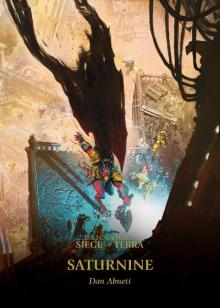 Saturnine
Saturnine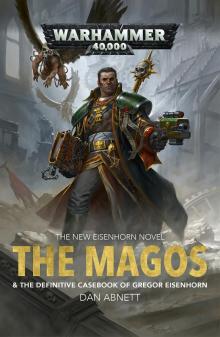 The Magos
The Magos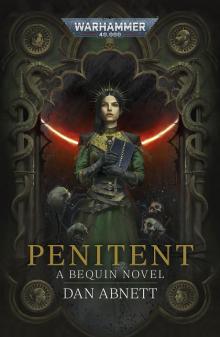 Penitent
Penitent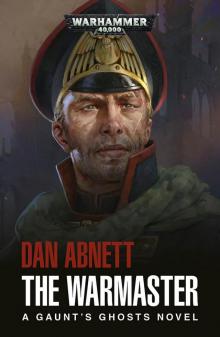 THE WARMASTER
THE WARMASTER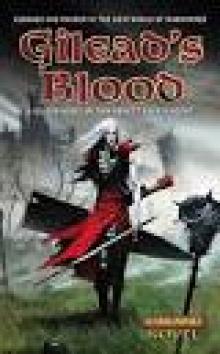 Gilead's Blood
Gilead's Blood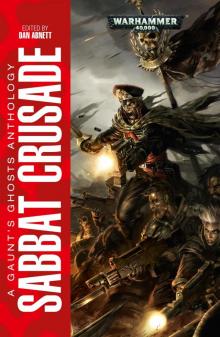 Sabbat Crusade
Sabbat Crusade![[Warhammer 40K] - Double Eagle Read online](http://i1.bookreadfree.com/i/03/16/[warhammer_40k]_-_double_eagle_preview.jpg) [Warhammer 40K] - Double Eagle
[Warhammer 40K] - Double Eagle![[Gaunt's Ghosts 02] - Ghostmaker Read online](http://i1.bookreadfree.com/i/03/16/[gaunts_ghosts_02]_-_ghostmaker_preview.jpg) [Gaunt's Ghosts 02] - Ghostmaker
[Gaunt's Ghosts 02] - Ghostmaker![[Gaunt's Ghosts 10] - The Armour of Contempt Read online](http://i1.bookreadfree.com/i/03/16/[gaunts_ghosts_10]_-_the_armour_of_contempt_preview.jpg) [Gaunt's Ghosts 10] - The Armour of Contempt
[Gaunt's Ghosts 10] - The Armour of Contempt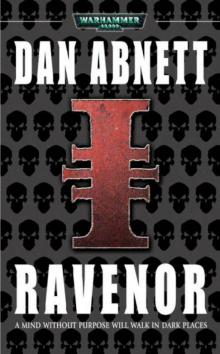 Ravenor
Ravenor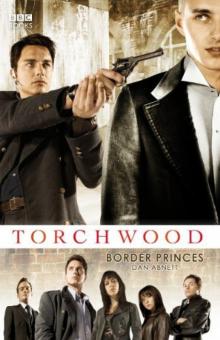 Border Princes
Border Princes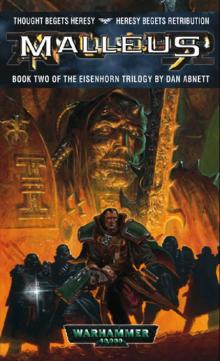 Warhammer - Eisenhorn 02 - Malleus (Abnett, Dan)
Warhammer - Eisenhorn 02 - Malleus (Abnett, Dan)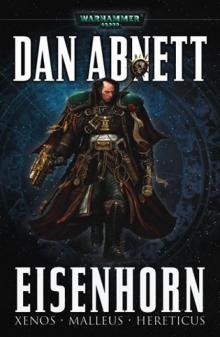 Eisenhorn Omnibus
Eisenhorn Omnibus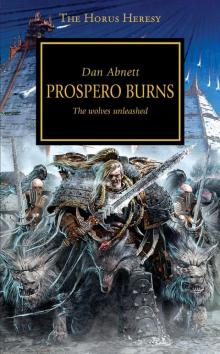 Prospero Burns
Prospero Burns The Story of Martha
The Story of Martha Extinction Event
Extinction Event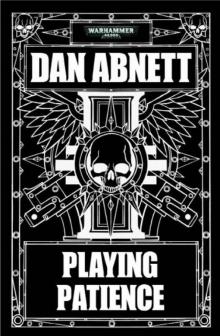 Playing Patience
Playing Patience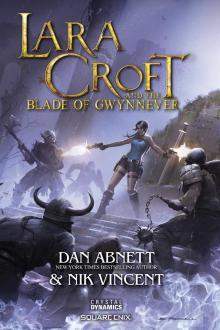 Lara Croft and the Blade of Gwynnever
Lara Croft and the Blade of Gwynnever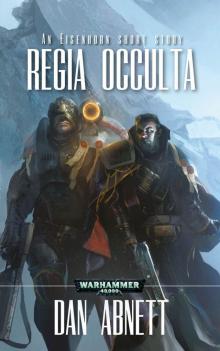 Regia Occulta
Regia Occulta![[Gaunt's Ghosts] - The Iron Star Read online](http://i1.bookreadfree.com/i/03/13/[gaunts_ghosts]_-_the_iron_star_preview.jpg) [Gaunt's Ghosts] - The Iron Star
[Gaunt's Ghosts] - The Iron Star![[Warhammer] - Fell Cargo Read online](http://i1.bookreadfree.com/i/03/13/[warhammer]_-_fell_cargo_preview.jpg) [Warhammer] - Fell Cargo
[Warhammer] - Fell Cargo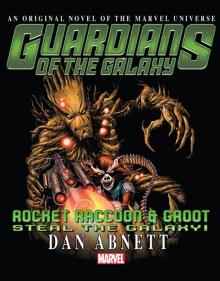 GUARDIANS OF THE GALAXY: ROCKET RACCOON & GROOT STEAL THE GALAXY!
GUARDIANS OF THE GALAXY: ROCKET RACCOON & GROOT STEAL THE GALAXY!![[Ravenor 01] Ravenor - Dan Abnett Read online](http://i1.bookreadfree.com/i/03/20/[ravenor_01]_ravenor_-_dan_abnett_preview.jpg) [Ravenor 01] Ravenor - Dan Abnett
[Ravenor 01] Ravenor - Dan Abnett![[Gaunt's Ghosts 06] - Straight Silver Read online](http://i1.bookreadfree.com/i/03/17/[gaunts_ghosts_06]_-_straight_silver_preview.jpg) [Gaunt's Ghosts 06] - Straight Silver
[Gaunt's Ghosts 06] - Straight Silver![[Ravenor 02] Ravenor Returned - Dan Abnett Read online](http://i1.bookreadfree.com/i/03/20/[ravenor_02]_ravenor_returned_-_dan_abnett_preview.jpg) [Ravenor 02] Ravenor Returned - Dan Abnett
[Ravenor 02] Ravenor Returned - Dan Abnett![[Gaunt's Ghosts 08] - Traitor General Read online](http://i1.bookreadfree.com/i/03/14/[gaunts_ghosts_08]_-_traitor_general_preview.jpg) [Gaunt's Ghosts 08] - Traitor General
[Gaunt's Ghosts 08] - Traitor General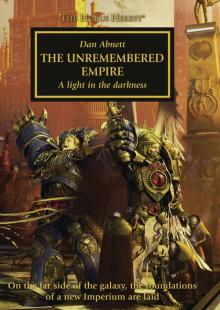 The Unremembered Empire
The Unremembered Empire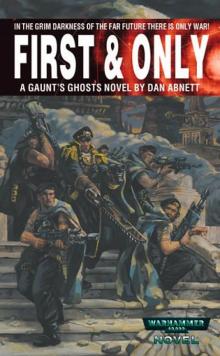 First and Only
First and Only![[Darkblade 05] - Lord of Ruin Read online](http://i1.bookreadfree.com/i/03/15/[darkblade_05]_-_lord_of_ruin_preview.jpg) [Darkblade 05] - Lord of Ruin
[Darkblade 05] - Lord of Ruin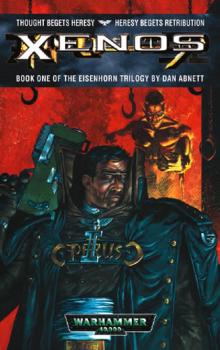 Warhammer - Eisenhorn 01 - Xenos (Abnett, Dan)
Warhammer - Eisenhorn 01 - Xenos (Abnett, Dan) Meduson
Meduson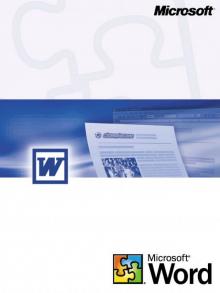 The Fall of Malvolion
The Fall of Malvolion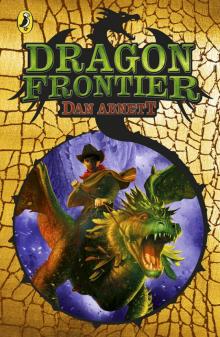 Dragon Frontier
Dragon Frontier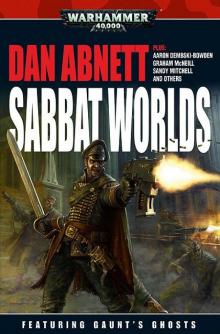 Sabbat Worlds
Sabbat Worlds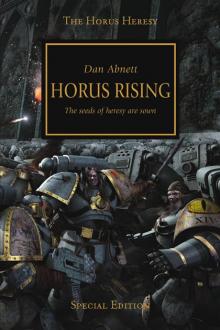 Horus Rising
Horus Rising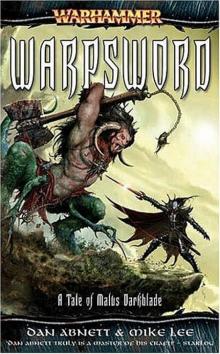 Warhammer - Darkblade 04 - Warpsword
Warhammer - Darkblade 04 - Warpsword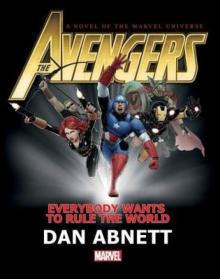 Avengers_Everybody Wants to Rule the World_Marvel Comics Prose
Avengers_Everybody Wants to Rule the World_Marvel Comics Prose![[Gaunt's Ghosts 04] - Honour Guard Read online](http://i1.bookreadfree.com/i/03/16/[gaunts_ghosts_04]_-_honour_guard_preview.jpg) [Gaunt's Ghosts 04] - Honour Guard
[Gaunt's Ghosts 04] - Honour Guard![[Darkblade 04] - Warpsword Read online](http://i1.bookreadfree.com/i/03/16/[darkblade_04]_-_warpsword_preview.jpg) [Darkblade 04] - Warpsword
[Darkblade 04] - Warpsword![[Gaunt's Ghosts 11] - Only in Death Read online](http://i1.bookreadfree.com/i/03/16/[gaunts_ghosts_11]_-_only_in_death_preview.jpg) [Gaunt's Ghosts 11] - Only in Death
[Gaunt's Ghosts 11] - Only in Death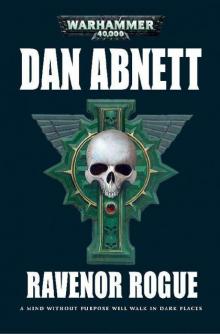 Ravenor Rogue
Ravenor Rogue![[Ravenor 03] Ravenor Rogue - Dan Abnett Read online](http://i1.bookreadfree.com/i/03/16/[ravenor_03]_ravenor_rogue_-_dan_abnett_preview.jpg) [Ravenor 03] Ravenor Rogue - Dan Abnett
[Ravenor 03] Ravenor Rogue - Dan Abnett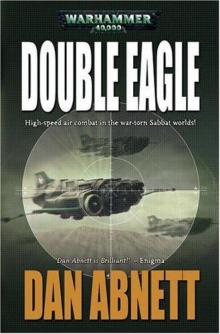 Double Eagle
Double Eagle Doctor Who - The Silent Stars Go By
Doctor Who - The Silent Stars Go By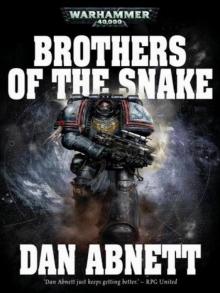 Brothers of the Snake
Brothers of the Snake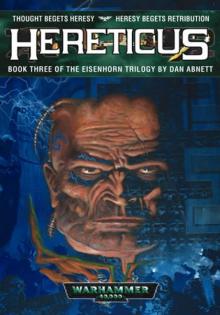 Warhammer - Eisenhorn 03 - Hereticus (Abnett, Dan)
Warhammer - Eisenhorn 03 - Hereticus (Abnett, Dan)![[Darkblade 03] - Reaper of Souls Read online](http://i1.bookreadfree.com/i/03/16/[darkblade_03]_-_reaper_of_souls_preview.jpg) [Darkblade 03] - Reaper of Souls
[Darkblade 03] - Reaper of Souls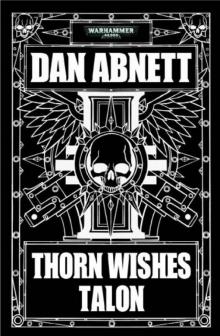 Thorn Wishes Talon
Thorn Wishes Talon Doctor Who
Doctor Who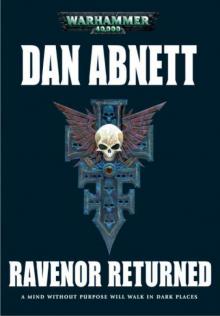 Ravenor Returned
Ravenor Returned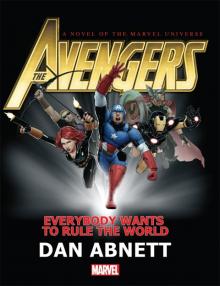 Avengers: Everybody Wants to Rule the World
Avengers: Everybody Wants to Rule the World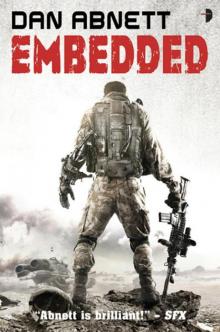 Embedded
Embedded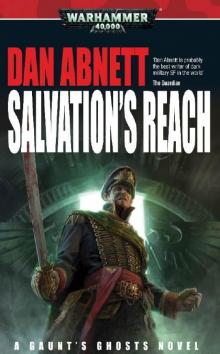 Salvation's Reach
Salvation's Reach![[Gaunt's Ghosts 03] - Necropolis Read online](http://i1.bookreadfree.com/i/03/19/[gaunts_ghosts_03]_-_necropolis_preview.jpg) [Gaunt's Ghosts 03] - Necropolis
[Gaunt's Ghosts 03] - Necropolis![[Darkblade 01] - The Daemon's Curse Read online](http://i1.bookreadfree.com/i/03/17/[darkblade_01]_-_the_daemons_curse_preview.jpg) [Darkblade 01] - The Daemon's Curse
[Darkblade 01] - The Daemon's Curse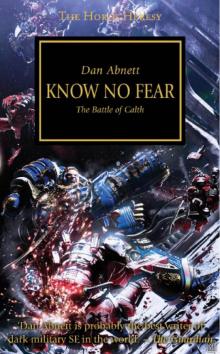 Know No Fear
Know No Fear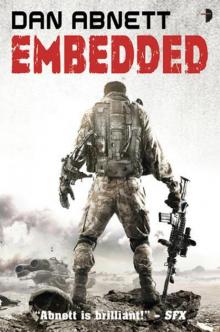 Dan Abnett - Embedded
Dan Abnett - Embedded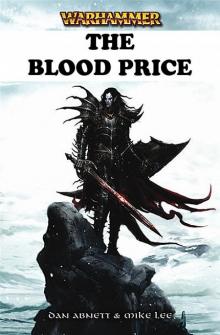 00.1 - The Blood Price
00.1 - The Blood Price![[Warhammer 40K] - Sabbat Worlds Read online](http://i1.bookreadfree.com/i/03/17/[warhammer_40k]_-_sabbat_worlds_preview.jpg) [Warhammer 40K] - Sabbat Worlds
[Warhammer 40K] - Sabbat Worlds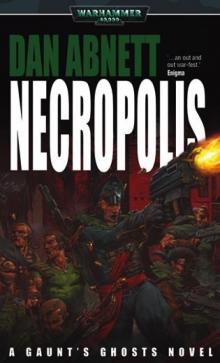 Necropolis
Necropolis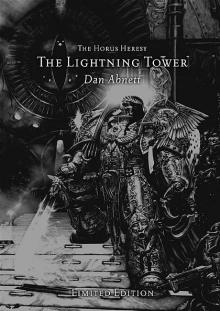 The Lightning Tower & The Dark King
The Lightning Tower & The Dark King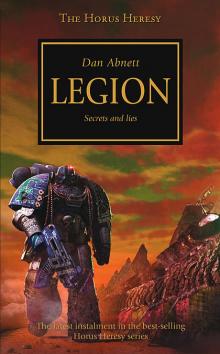 Legion
Legion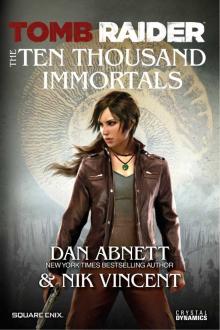 Tomb Raider: The Ten Thousand Immortals
Tomb Raider: The Ten Thousand Immortals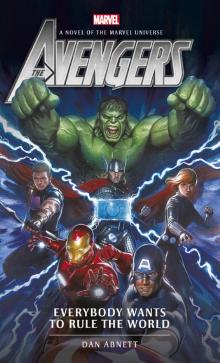 Avengers
Avengers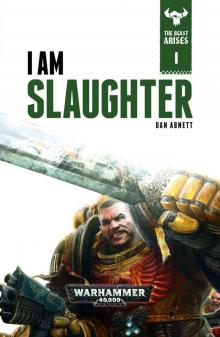 I am Slaughter
I am Slaughter![[Gaunt's Ghosts 07] - Sabbat Martyr Read online](http://i1.bookreadfree.com/i1/04/02/[gaunts_ghosts_07]_-_sabbat_martyr_preview.jpg) [Gaunt's Ghosts 07] - Sabbat Martyr
[Gaunt's Ghosts 07] - Sabbat Martyr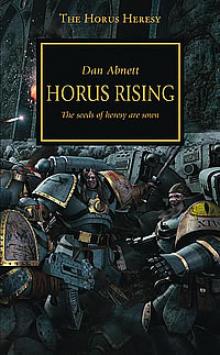 The Horus Heresy: Horus Rising
The Horus Heresy: Horus Rising![[Gaunt's Ghosts 01] - First & Only Read online](http://i1.bookreadfree.com/i1/04/02/[gaunts_ghosts_01]_-_first_&_only_preview.jpg) [Gaunt's Ghosts 01] - First & Only
[Gaunt's Ghosts 01] - First & Only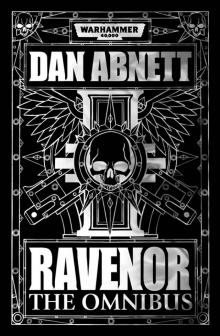 Ravenor Omnibus
Ravenor Omnibus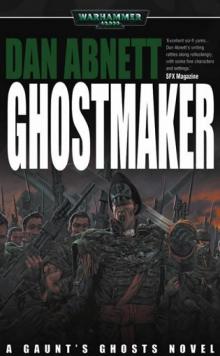 Ghostmaker
Ghostmaker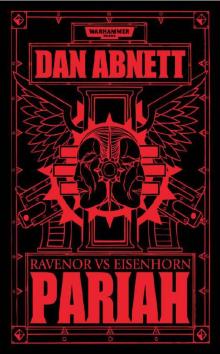 Pariah: Eisenhorn vs Ravenor
Pariah: Eisenhorn vs Ravenor![[Gaunt's Ghosts 12] - Blood Pact Read online](http://i1.bookreadfree.com/i1/04/04/[gaunts_ghosts_12]_-_blood_pact_preview.jpg) [Gaunt's Ghosts 12] - Blood Pact
[Gaunt's Ghosts 12] - Blood Pact![[Gaunt's Ghosts 05] - The Guns of Tanith Read online](http://i1.bookreadfree.com/i1/04/01/[gaunts_ghosts_05]_-_the_guns_of_tanith_preview.jpg) [Gaunt's Ghosts 05] - The Guns of Tanith
[Gaunt's Ghosts 05] - The Guns of Tanith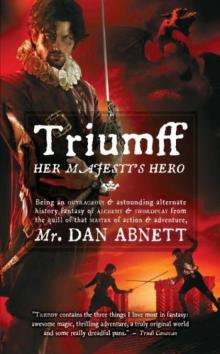 Triumff: Her Majesty's Hero
Triumff: Her Majesty's Hero![[Gaunt's Ghosts 09] - His Last Command Read online](http://i1.bookreadfree.com/i1/04/02/[gaunts_ghosts_09]_-_his_last_command_preview.jpg) [Gaunt's Ghosts 09] - His Last Command
[Gaunt's Ghosts 09] - His Last Command![[Darkblade 00.1] - The Blood Price Read online](http://i1.bookreadfree.com/i2/04/03/[darkblade_00_1]_-_the_blood_price_preview.jpg) [Darkblade 00.1] - The Blood Price
[Darkblade 00.1] - The Blood Price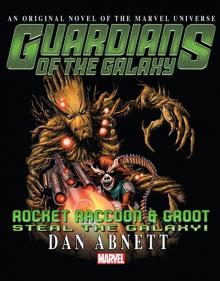 Guardians of the Galaxy: Rocket Raccoon and Groot - Steal the Galaxy!
Guardians of the Galaxy: Rocket Raccoon and Groot - Steal the Galaxy!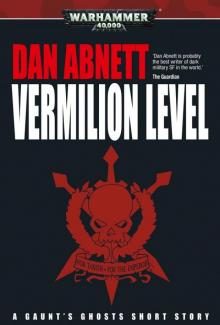 Vermilion Level
Vermilion Level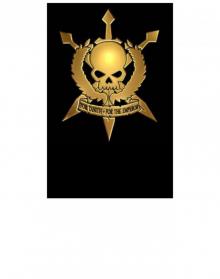 In Remembrance
In Remembrance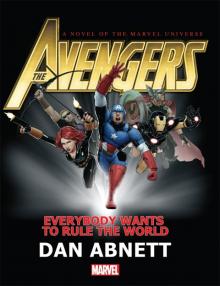 The Avengers: Everybody Wants to Rule the World
The Avengers: Everybody Wants to Rule the World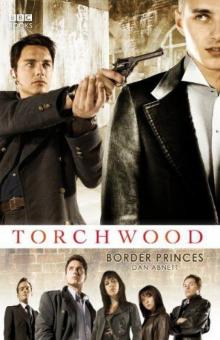 Border Princes t-2
Border Princes t-2![[Darkblade 02] - Bloodstorm Read online](http://i1.bookreadfree.com/i2/04/07/darkblade_02_-_bloodstorm_preview.jpg) [Darkblade 02] - Bloodstorm
[Darkblade 02] - Bloodstorm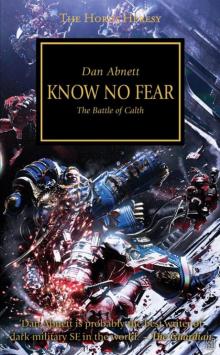 Know no fear. The Battle of Calth hh-19
Know no fear. The Battle of Calth hh-19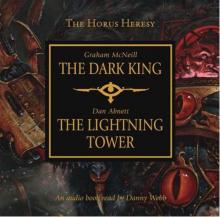 The Dark King and The Lightning Tower
The Dark King and The Lightning Tower